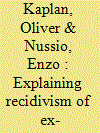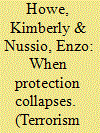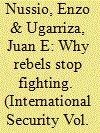|
|
|
Sort Order |
|
|
|
Items / Page
|
|
|
|
|
|
|
| Srl | Item |
| 1 |
ID:
134988


|
|
|
|
|
| Summary/Abstract |
Illegal organizations, like mafia syndicates, gangs, and insurgencies, are often highly cohesive and hostile toward the outside world. Such groups cultivate a particular form of “anti-social” capital, which relies on ingroup bonding and limits outgroup bridging for the purpose of commissioning illicit acts. We argue that experiences within the group leave members with varying intensities of anti-social capital, and that higher intensities lead to significantly weaker relationships with political institutions and civil society, even many years after they exit the group. We test this theory using survey data from 1,485 former members of insurgent and paramilitary groups in Colombia, along with insights from 68 qualitative interviews. We find strong evidence that anti-social capital has individually varying and sticky effects on former members. These effects are pervasive and intense, and exhibit surprising and counterintuitive properties: former members of pro-state militia with higher levels of anti-social capital are systematically less likely to trust political institutions, while members of peasant-based insurgent groups with high levels of anti-social capital are less likely to participate in their communities.
|
|
|
|
|
|
|
|
|
|
|
|
|
|
|
|
| 2 |
ID:
170033


|
|
|
|
|
| Summary/Abstract |
Mistrust between conflict parties after civil war is a major hurdle to sustainable peace. However, existing research focuses on elite interactions and has not examined the trust relationship between government and rank-and-file members of armed groups, despite their importance for postconflict stability. We use the unexpected decision of the Colombian government to extradite top-level former paramilitary leaders to the United States in 2008 to identify how a peace deal reversal influences ex-combatants’ trust in government. In theory, they may lose trust for instrumental reasons, if they suffer personal costs, or for normative reasons, if they think the government is failing its commitments. Using quasi-experimental survey evidence, we find that extradition decreases trust substantially among ex-paramilitaries, but not in a comparison group of ex-guerrillas not part of the same peace deal. Even though paramilitaries are seen as particularly opportunistic, our evidence suggests that normative rather than instrumentalist considerations led to trust erosion.
|
|
|
|
|
|
|
|
|
|
|
|
|
|
|
|
| 3 |
ID:
157509


|
|
|
|
|
| Summary/Abstract |
What determines the recidivism of ex-combatants from armed conflicts? In postconflict settings around the world, there has been growing interest in reintegration programs to prevent ex-combatants from returning to illegal activities or to armed groups, yet little is known about who decides to “go bad.” We evaluate explanations for recidivism related to combatant experiences and common criminal motives by combining data from a representative survey of ex-combatants of various armed groups in Colombia with police records of observed behaviors that indicate which among the respondents returned to belligerent or illegal activities. Consistent with a theory of recidivism being shaped by driving and restraining factors, the results suggest that factors such as antisocial personality traits, weak family ties, lack of educational attainment, and the presence of criminal groups are most highly correlated with various kinds of recidivism and hold implications for programs and policies to successfully reintegrate ex-combatants into society.
|
|
|
|
|
|
|
|
|
|
|
|
|
|
|
|
| 4 |
ID:
172167


|
|
|
|
|
| Summary/Abstract |
An important puzzle in the study of political violence is why individuals risk their lives fighting for a public good, when they can free-ride and enjoy the same benefits if others take the risk. This logic is particularly important to rationalist theories, which view risk as an inherent cost to violent armed group participation—which has to be offset by selective incentives, peer pressure, or coercion. This perspective has widely contributed to the understanding of violent conflict, but ignores key insights from psychology. What if risk is not a cost and instead attractive? In this article, I argue that people with a sensation seeking personality—interested in novel and intense experience and willing to accept risk for the sake of it—are more likely to join armed groups. Preliminary survey evidence comparing voluntarily and forcibly recruited members of Colombian armed groups supports my argument. The re-interpretation of a series of existing studies on Colombian guerrilla and paramilitary fighters illustrates the pervasiveness and varying manifestations of sensation seeking. Personality traits are an under-recognized ingredient in the process of joining armed groups and complement our current understanding, which is mainly determined by contextual conditions and situational motivations.
|
|
|
|
|
|
|
|
|
|
|
|
|
|
|
|
| 5 |
ID:
148932


|
|
|
|
|
| Summary/Abstract |
The implementation of peacebuilding activities, including the demobilization of non-state illegal actors, does not necessarily bring about a reduction in violence. While there are several theories that address the causes of persistent violence, there are few that adequately explain why rates of violence can rapidly increase in a post-demobilization context. Using the method of process tracing, this article explores the case of Córdoba Department, Colombia, where rates of violence have increased after the demobilization of paramilitary groups (Autodefensas Unidas de Colombia [AUC]) in 2005. We argue that the AUC created and maintained a monopolistic illegal protection system during its years of operation, and this type of local order was able to contain violence. After demobilization, the protection system was disrupted and as a consequence, new competition between post-demobilization criminal organizations for existing illegal rents developed, petty crime became pervasive, and revenge killings spiked, thus contributing to increased rates of violence in the post-demobilization period. Our theory about the breakdown of protection finds support in other AUC-dominated regions of Colombia.
|
|
|
|
|
|
|
|
|
|
|
|
|
|
|
|
| 6 |
ID:
177845


|
|
|
|
|
| Summary/Abstract |
Desertion, or the unauthorized exit from an armed group, has major implications for counterinsurgency, war termination, and recruitment dynamics. While existing research stresses the importance of individual motivations for desertion, organizational decline, in the form of military and financial adversity, can also condition desertion. Organizational decline undermines a group's instruments to channel individual preferences into collective action. These instruments include selective incentives, ideological appeal, and coercion. When the binding power of these instruments diminishes, individual desires start to dominate behavior, making desertion more likely. The Revolutionary Armed Forces of Colombia (FARC) insurgency is used to examine this argument with a multimethod approach. First, a quantitative analysis employs unique data on more than 19,000 reported FARC deserters from 2002 to 2017, provided by the Colombian Ministry of Defense. Guarding against threats to causal inference, statistical analysis indicates that organizational decline drives desertion. Second, a qualitative analysis uses a large body of detailed reports on interviews with deserters conducted by Colombian military personnel. The reports demonstrate that organizational decline weakens selective incentives, group ideology, and a credible coercive regime, and fosters desertion through these mechanisms. These findings provide key insights for policymakers, given that desertion can both contribute to ending conflict and accelerate the recruitment of new combatants.
|
|
|
|
|
|
|
|
|
|
|
|
|
|
|
|
|
|
|
|
|